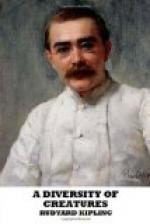Only the Lord can understand
When those
first pangs begin,
How much is reflex action
and
How much
is really sin.
E’en from good
words thyself refrain,
And tremblingly
admit
There is no anodyne
for pain
Except the
shock of it.
So, when thine own dark
hour shall fall,
Unchallenged
canst thou say:
’I never worried
you at all,
For God’s
sake go away!’
The Village that Voted the Earth was Flat
(1913)
Our drive till then had been quite a success. The other men in the car were my friend Woodhouse, young Ollyett, a distant connection of his, and Pallant, the M.P. Woodhouse’s business was the treatment and cure of sick journals. He knew by instinct the precise moment in a newspaper’s life when the impetus of past good management is exhausted and it fetches up on the dead-centre between slow and expensive collapse and the new start which can be given by gold injections—and genius. He was wisely ignorant of journalism; but when he stooped on a carcase there was sure to be meat. He had that week added a half-dead, halfpenny evening paper to his collection, which consisted of a prosperous London daily, one provincial ditto, and a limp-bodied weekly of commercial leanings. He had also, that very hour, planted me with a large block of the evening paper’s common shares, and was explaining the whole art of editorship to Ollyett, a young man three years from Oxford, with coir-matting-coloured hair and a face harshly modelled by harsh experiences, who, I understood, was assisting in the new venture. Pallant, the long, wrinkled M.P., whose voice is more like a crane’s than a peacock’s, took no shares, but gave us all advice.
‘You’ll find it rather a knacker’s yard,’ Woodhouse was saying. ’Yes, I know they call me The Knacker; but it will pay inside a year. All my papers do. I’ve only one motto: Back your luck and back your staff. It’ll come out all right.’
Then the car stopped, and a policeman asked our names and addresses for exceeding the speed-limit. We pointed out that the road ran absolutely straight for half a mile ahead without even a side-lane. ’That’s just what we depend on,’ said the policeman unpleasantly.
‘The usual swindle,’ said Woodhouse under his breath. ’What’s the name of this place?’
‘Huckley,’ said the policeman. ‘H-u-c-k-l-e-y,’ and wrote something in his note-book at which young Ollyett protested. A large red man on a grey horse who had been watching us from the other side of the hedge shouted an order we could not catch. The policeman laid his hand on the rim of the right driving-door (Woodhouse carries his spare tyres aft), and it closed on the button of the electric horn. The grey horse at once bolted, and we could hear the rider swearing all across the landscape.
‘Damn it, man, you’ve got your silly fist on it! Take it off!’ Woodhouse shouted.




